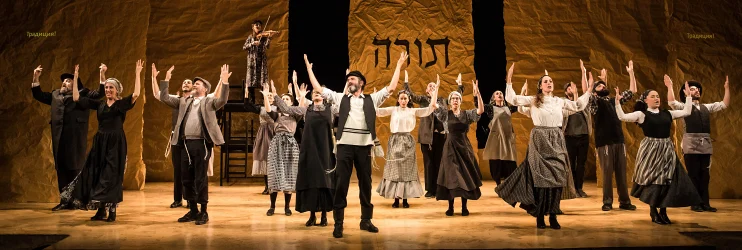Review of Fiddler on the Roof (in Yiddish) at Stage 42
Full disclosure - I saw Zero Mostel in Fiddler on the Roof on Broadway in 1965. My sister and I sat audience left very close to the front and I think the tickets were $9.95. I wasn't crazy for Mostel who was doing schtick that made the audience howl but had nothing to do with the story. It bugged me. Even at 15 I was one smart shiksa.
Speaking of which, have you ever noticed how many words we have looted from the Yiddish? America is not the home of the King's English - we speak Mongrel. Someone sneezes we say, "gezunterheyt." "Kinder" (as in Kindergarten). Mensch. Bagel. Meshuge. Come to this production and you will hear them rolling off the tongue of the actors portraying the people who survived the Russians (in this case) and brought their families, hopes and creativity to this country. Oh, them immigrants...
Sound familiar, nu?
The National Yiddish Theatre Folksbiene (NYTF) production of Fiddler on the Roof (in Yiddish), now at Stage 42, takes the daring step of returning this story to its Yiddish roots. This is the Fiddler that was given to us as The Dairyman Vignettes by Sholem Aleichem (the pen name of Solomon Naumovich Rabinovich) born in 1859 in what was then Russia (now The Ukraine). This is the language of the people who filled the pages. And this is, ultimately, why the production works. The language is at the center of the tale.
Steven Skybell is a sincere Teyve who is just realizing that his daughters Hodl (Stephanie Lynn Mason), Tsaytl Tsaytl (Rachel Zatcoff), Khave (Evan Mayer), Shprintze (Raquele Nobile) and Beylke (Samantha Hahn) are growing up and making their own decisions. You raise them and you let them go he tells God in one of the many one-sided conversations. But what if they go down a path you have not prepared? What if they think outside the preverbal box? When tradition is the center of life, what happens when it is shaken. In that case, you will make a new tradition.
While this production lacks snap-crackle and pop, there is a foundation of purity, of truth. The original production of Fiddler had little in the way of reality. It bypassed any seriousness of the threat to immigrants all over the world. This was the 1960's and the biggest threat to Americans was the Beatles' hair. The more recent production in 2016 was a dark, penetrating re-examination of the tale. This Fiddler falls somewhere in between. Text wise there is more social commentary focus. "Girls need to learn. Girls are people." "The rich are criminals...There'll come a day, and all their capital will belong to us." The threat of rebellion is in the air. Neighbors turn on neighbors because of orders. Neighbors support neighbors' new ideas because the real tradition is their connection. And their language. By giving us the tale in Yiddish, Joel Grey and this company make us listen in ways for which we are unprepared. The sound of language opens more than the ears. It opens the heart. I read a post on FaceBook the other day - it read "Never make fun of someone who speaks broken English. It means they know another language."
Ultimately this production works for mysterious reasons. The language is the loom on which the tapestry is created. We are lured in without knowing it, and when the last person pulls their wheelbarrow out of Anatevka, we know in our gut that they may never see one another again. The community we have come to love is no more.
And what of us? What of our community? What of our connection to one another in the face of this shabby and shameful government? These are the questions left behind as the last fiddler leaves the stage.
(Photo by Matthew Murphy)
WHAT THE OTHER CRITICS SAID
"Though it features a Broadway-quality Tevye in Steven Skybell and, for Off-Broadway, a high level of professionalism throughout, the Folksbiene production, directed by the actor Joel Grey, cannot (and does not aim to) achieve the status and polish of mass entertainment. Rather, it offers a kind of authenticity no other American Fiddler ever has: It's in Yiddish."
Jesse Green for New York Times
"Admittedly, this may not be the most spectacularly sung, danced or designed Fiddler ever to hit the stage, but it's likely the most authentic thanks to the use of Yiddish and the focus on genuine feelings. At times it's more like a séance than a show. The turn-of-the-20th-century village of Anatevka may be fictional, but its denizens feel wonderfully, vibrantly alive."
Raven Snook for Time Out New York
"How do you take a 1964 musical blockbuster seen in countless revivals and tours, not to mention a robust big-screen treatment that still holds up, and imbue it with illuminating new life? In the case of director Joel Grey's shattering reclamation of Fiddler on the Roof, it's simply a matter of hearing the familiar work in a new language. Or more accurately, an ancient language. A sleeper hit last summer at Lower Manhattan's Museum of Jewish Heritage, this lovingly mounted staging from the National Yiddish Theatre Folksbiene has transferred uptown to a commercial venue, delivering raw emotionality, boisterous humor and cultural authenticity that will stir you whether you're experiencing the show for the first time or the 15th."
David Rooney for Hollywood Reporter
Originally published on
